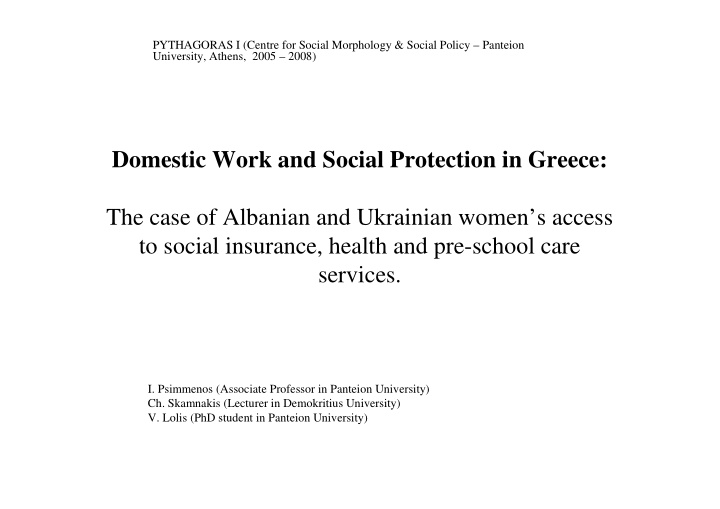



PYTHAGORAS I (Centre for Social Morphology & Social Policy – Panteion University, Athens, 2005 – 2008) Domestic Work and Social Protection in Greece: The case of Albanian and Ukrainian women’s access to social insurance, health and pre-school care services. I. Psimmenos (Associate Professor in Panteion University) Ch. Skamnakis (Lecturer in Demokritius University) V. Lolis (PhD student in Panteion University)
Research Project’s Background • Follow up from IAPASIS project (Does implementation matter? / KEKMOKOP – Panteion University) • Focus on low status services and immigrants • Focus on occupational categories and obstacles to welfare • Focus on gender • Focus on patterns of employment and work tasks • Focus on formal and informal strategies to welfare services
The population (March 2004 – August 2007) • 31 Albanian domestic workers (10 years in Greece) • 11 Ukrainian domestic workers (10 years in Greece) • 30 front-line officers in social insurance, medical centres and nurseries
Demographic & Social Characteristics of Migrant Women (42 in-depth interviews) Ukrainian Albanian Age Range 20 – 65 years <30 50> Education Technical Technical – University Marital status Married with children Single – parent families Employment status Piece-rate work / casual job in Unemployed – part time in retailing services Family unification Job seeking Reason for migration Family unification visas Tourist visas Immigration status (initial entry) House-sharing with keen Boarding places Residential status Cleaning – miscellaneous Care – Household (live-in Type of work domestic work) Single household employment Multi – share employment Type of employment 10 yrs 10 yrs Duration in Greece
Obstacles to welfare benefits (migrant women) The case of social insurance Objective factors (financial – work based reasons) Albanian Domestic Workers Ukrainian Domestic Workers • Entry status – spouse dependencies • Entry status – financial and social (receiving country) dependencies (agencies, family) • Casual labour market niches (temporal • Casual labour market niches (personal / services) customised services) • On-call or day labourers (direct hire) • Formal / informal agency temporaries • Multi – share employment (multiemployer • Board indussive employment patterns) • Task – duty compromise • Diversity of tasks • Status discontinuity • Status discontinuity
Obstacles to welfare benefits (migrant women) The case of social insurance Subjective factors (filiations – perceptions – habits) Albanian Domestic Workers Ukrainian Domestic Workers • Expectations – supplementary income / • Expectations – quick returns / short period family maintenance – short period of stay of stay • Demoralization (spouse relations – roles – • Demoralization (family break – mores) prospects) • Cash for work mendalité • Savings and residential sanctuary • Perceptual motivations to employment • Perceptual motivations to employment (self-employment – social networks) (personal safety) • Perceptual motivations to work (filliations • Perceptual motivations to work – safety) (psychological mobility) • Exchange of rights for security • Exchange of rights for tenure in mobility • Informal welfare practices • Informal welfare practices
Obstacles to welfare benefits (front-line officers) The case of social insurance Objective factors • Deregulation of welfare regime • Weak and residual welfare regime • Limited extent adaptations to welfare clients • Work conditions – Not eligible by reason of uninsured work – Unstable and non-standardized employment • Limited welfare provisions against weak social groups
Obstacles to welfare benefits (front-line officers) The case of social insurance Subjective factors • Gate keeping / line of defence • Extended informal practices against new groups of welfare consumers • Discriminative practices based on stereotypes – Occupational status – Ethnic (origin)
Conclusion • Immigration policy • Low status services • Officers responses • Informal practices & attitudes to welfare benefits • Welfare marginalization
Recommend
More recommend